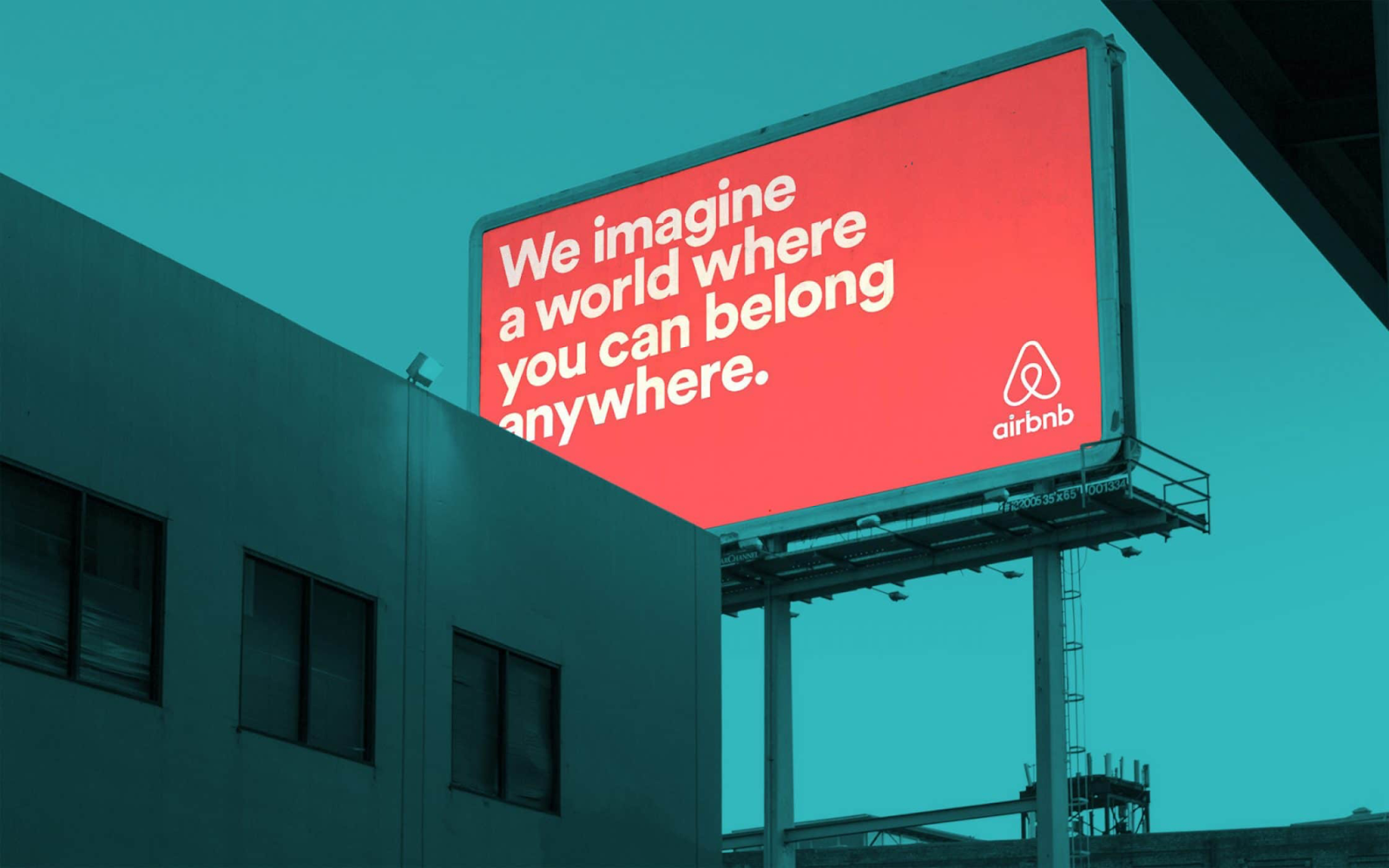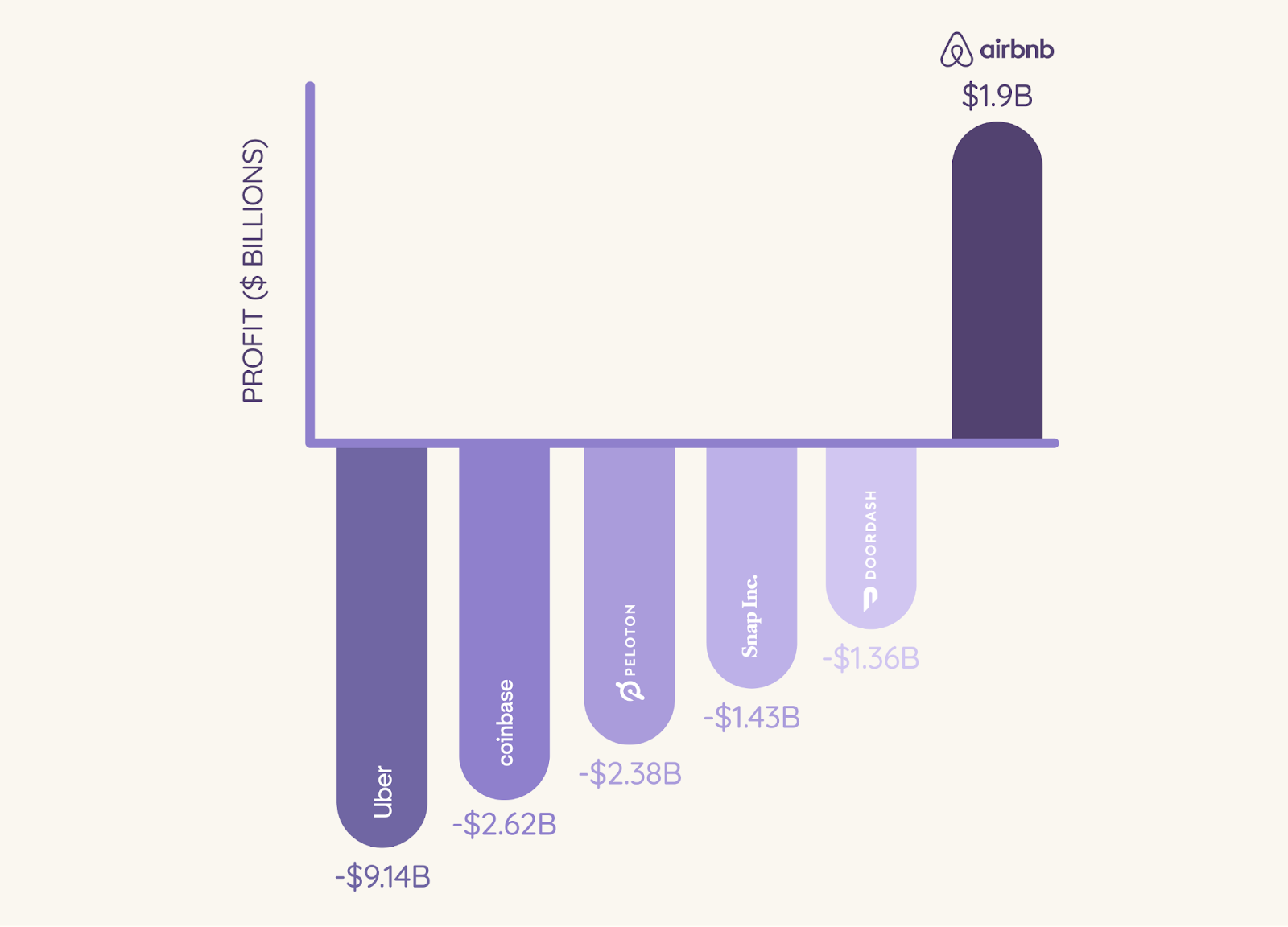How Airbnb proves the power of brand

Airbnb, Uber, Doordash and Pinterest. All household names, but would you believe that while the latter are making billions in losses, Airbnb is making a meaningful profit, year after year?

Although slowing from its profitable heights in 2023, Airbnb is still experiencing year-on-year revenue growth – for example, it saw $3.7 billion of revenue in Q3 2024, a 10% increase compared to Q3 2023.
So how did Brian Chesky, Airbnb’s CEO, and his team manage it?
We believe that alongside a fantastic product, strong management and a motivated team, it boils down to this key fact: brand investment.
Sign up to Shorts
For fortnightly brand insights, stories and goodness that'll help you win (we promise).
A tectonic shift that paid off, literally 💸
Two years ago, Airbnb made the shiftOpens in new tab from a performance-centric marketing strategy, to a brand-centric one.
That meant dialing down spending on search marketing, pay-per-click and other conversion driven activities, while turning up PR, investing in more out-of-home advertising and nurturing previous users to boost retention.
According to Tracksuit data, in the US they have 86% brand awareness (on par with Hilton – a brand that was founded in 1919) in the travel accommodation category that has over 196 million people in it.
This converts down to 17% preference for the service (that’s 33.5 million people), which is strong compared to long established, high trust brands like Hilton and Marriott, clocking in 22% and 20% preference, respectively.

Airbnb's metrics have grown in the last year, too. From Jan '24 to Dec '24, awareness has increased from 83% to 86%, and usage from 38% to 44%.
To understand how Airbnb’s brand is being perceived, we used the Tracksuit dashboard to compare it to Hilton.
Airbnb is often described as innovative, cool, and different, appealing to those seeking a new and interesting experience. Hilton Hotels, on the other hand, is associated with a classic, high-end, and prestigious image, attracting those looking for a more traditional and high-class hotel experience.
Airbnb are also known for its innovative, smart creative within its campaigns, exemplified in 2022 by its minimalistic Out-Of-Home billboardsOpens in new tab, featuring witty, simple-to-understand copy to launch its new "Categories" feature. The billboards were rolled out in 22 markets around the world.

It applies the same ethos to this clever 15-second adOpens in new tab, which compares the claustrophobic cramp of a hotel room to a spacious Airbnb house.
Airbnb’s brand image appears to be in line with Chesky’s visionOpens in new tab: “We have an offering that’s really unique, and so people are deeply passionate about it, they tell one another and Airbnb has become a noun and a verb used all over the world.”
However, Airbnb proves that you need to make brand and performance work together
Though Airbnb is an ideal case study for the power of brand, due to its outspoken advocacy for how brand strategy makes an impact on its profitability, the company also knows one can’t exist without the other.
Brian Chesky, Airbnb’s CEO, compares performance marketing to a “laser”, telling Lenny’s PodcastOpens in new tab that performance clearly has its place. “We used to have this metaphor of lasers, flash bulbs and chandeliers. If you want to light up a room, performance marketing is a laser. You don’t want to use a bunch of lasers to light up an entire room – you should use a chandelier. That’s what brand marketing is.
“Performance marketing, though, doesn't create very good accumulating advantages because it's not an investment.”
Airbnb’s CFO: We made the right decision
Marketers often tell us about their struggle fighting for more investment (or worse, to avoid budget cuts). Usually, these conversations involve a CFO that’s hungry for evidence to be served in support of brand marketing driving commercial gains.
For Airbnb, the financial gains are clear and their CFO, Dave Stephenson, agrees with the company’s move to brand-centricity.
“We made that shift and it has proven to have been the right shift, not only in 2019 but in 2020 and 2021.”
Brand marketing drives long-term growth and profitability 💪
James HurmanOpens in new tab, Global Marketing Effectiveness Expert (and Tracksuit's Co-Founder) is unsurprised to see Airbnb’s record results: "The financial case for brand is indisputable".
Research has proven this time and time again that while performance marketing drives short-term sales activation, it's brand marketing that drives long-term, sustainable growth and profitability.
While we know that brand drives commercial success, traditionally it has been time consuming to measure and comes with a hefty price tag – until now.
Tracksuit’s always-on dashboard tracks the growth of your brand awareness, consideration and preference over time and shows how well you’re converting down the funnel. It also provides insight on how your brand is perceived in the market. All this information is beautifully presented alongside your chosen competitive set to give context.
This gives you the ability to measure the impact of your brand building efforts and demonstrate a return on marketing spend.
Tracksuit is the easy way for marketers to answer the question "Is what we're doing, working?"








